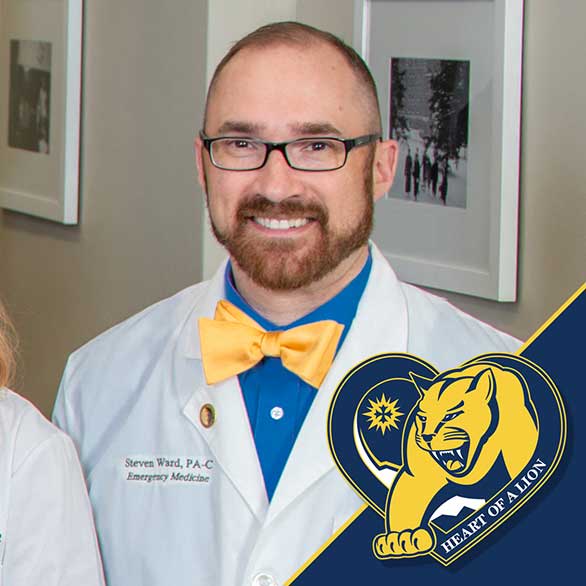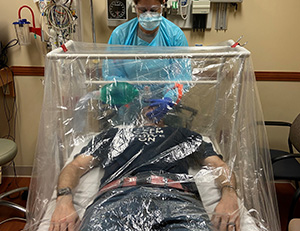

Steven Ward, Principal Physician Assistant faculty member at Mount St. Joseph University, creates device for respiratory emergency departments during the COVID-19 pandemic.
Steven Ward, MHS/MMS, NRP, PA-C, Principal Physician Assistant faculty member in Mount St. Joseph University's PA program and his wife, Erin Ward have helped create an extra level of safety with a device used for the respiratory emergency departments during the COVID-19 pandemic. As an Emergency Department Physician Assistant with an EMT background, he and his wife, a Nurse Clinical Coordinator in the Emergency Department, are working on the front lines in our city and doing what they can to do their part to take care of patients in light of the pandemic.
“One of the challenges we noted early on during the rise of COVID-19 in the area (and nationally) was treating patients with respiratory complaints had become more complicated and dangerous to healthcare providers,” says Ward. “Under normal circumstances, many patients with respiratory complaints would receive treatments such as nebulized medications or non-invasive ventilatory support to help improve their symptoms and prevent them from being intubated (having a breathing tube placed through their mouth to their lungs) and placed on ventilators to help their breathing. Ventilators quickly became critically short in supply nationwide. With COVID-19, these traditional treatments create a fine mist exhaled from the patient that could be laden with the SARS-CoV-2 virus and would significantly increase the risk of exposure to healthcare workers both in the hospitals and in ambulances.”
Thus, Steven and his wife still regularly work in the emergency department, and with the number of COVID-19 cases continuing to rise, they felt called to try and do something more.
“My wife and I recognized that these traditional treatments still held incredible value to respiratory patients, but the aerosols they generated were forcing the hand of healthcare providers to avoid them,” he says. Faced with this conundrum, they tried to seek a way to bring these treatments back into practice, but at a decreased risk to healthcare providers. So, a couple of weekends ago, in their basement, they conceived the idea for a Widespread Aerosol Reduction Device. This device would allow healthcare providers to continue to use the aerosol generating procedures but contain the aerosol cloud in a "tent,” around the patient and not spread the "cloud" of exhaled virus all about the room.
 The Widespread Aerosol Reduction Device- Emergency Department Model
The Widespread Aerosol Reduction Device- Emergency Department Model
“We created two forms of the device, one for emergency department use and the other for EMS (ambulance) use,” says Ward. “I am currently working on a third iteration for use in medical helicopters.”
In addition to this, Steven has also been working daily with my area fire and EMS departments and the public health district to identify and mitigate potential exposure risks to our first responders. He tracks all exposures and makes determination on quarantine and return work procedures for each individual case.
MSJ extends its gratitude to Steven and all health care workers on the front lines exhibiting the heart of a lion during this pandemic.
Do you know someone in the Mount Community with the Heart of a Lion?
Click here for more stories and information about how to submit a Mount community member for consideration to be recognized for demonstrating the Heart of a Lion.

